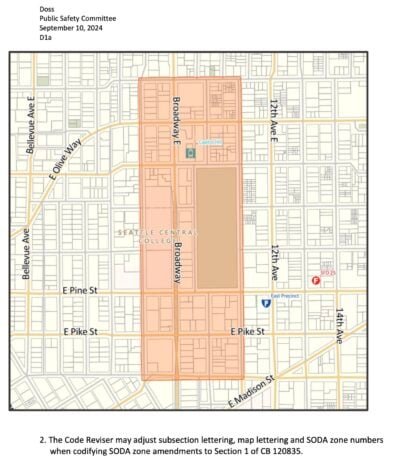With reporting by Hannah Saunders
The Capitol Hill “Stay Out of Drug Area” leads the city in banishment orders. The challenger to Ann Davison in the race for the Seattle City Attorney’s office says she will not enforce it.
“This was a failed policy that my opponent championed back, despite experts opposing it,” Erika Evans tells CHS. “Banishing people does not work. Prosecuting someone’s presence is not effective.”
Evans says the policies are racist and inequitably applied. They are also having no impact on reducing the public drug use and street disorder they were intended to address.
The zones and the policies that championed them are at the center of debate as Evans and Davison head toward the November 4th election.
This summer, City Attorney challenger Evans rode a wave of anti-Trump defiance to a top finish in the primary. Evans, a former federal prosecutor, has emphasized her record as a civil rights prosecutor with a dedication to public service and personal experience with poverty in her campaign.
Evans says her campaign is about more than SODA. One example is Davison’s elimination of Seattle’s Community Court. The program was volunteer-based and people with misdemeanor charges, like sleeping in a public park, were connected with community resource centers to develop a game-plan for solving underlying challenges, like being unhoused.
“We’re going to bring back a reimagined new community court that gives people the right response and connects people with services,” Evans said.
Evans has been looking at community courts in Tacoma, Auburn, Redmond, and Bellevue, and noted how some conduct these courts in a library, where treatment and service providers show up to assist with housing, inpatient treatment, getting an ORCA card, or even finding a foster home for one’s pet.
“Having that all in one place is the right way to do it,” Evans said.
Davison defends her record and says programs like the SODA zones have been effective.
The new zones are on Capitol Hill, and in the International District, Belltown, the University District, and Pioneer Square with the new SOAP zone covering Aurora. More could be added.
Under the legislation, a designation allows a judge to bar drug or prostitution law offenders busted in a zone from reentering the area for up to two years. A SODA or SOAP order can also be imposed as a condition of release from jail. Violating an order will become a new gross misdemeanor, punishable by up to 364 days in jail and a $5,000 fine. Davison says the process begins with police, with a spokesperson telling CHS its office receives referrals from SPD and reviews the referrals “to determine if there are sufficient legal grounds to move the case forward.”
In September, Davison told the Seattle City Council that the bottom line goals of the SODA program she championed are simple — “to disrupt open air drug markets.”
“If we just see less of the activity, they are working,” Davison said.
Davison said her office was just beginning to receive cases involving the first violations of SODA orders since the new zones went into effect over the past year but that violations of the orders appeared to be a rarity.
 $5 A MONTH TO HELP KEEP CHS PAYWALL-FREE
$5 A MONTH TO HELP KEEP CHS PAYWALL-FREE
Subscribe to CHS to help us hire writers and photographers to cover the neighborhood. CHS is a pay what you can community news site with no required sign-in or paywall. To stay that way, we need you. Become a subscriber to help us cover the neighborhood for $5 a month — or choose your level of support 🖤




